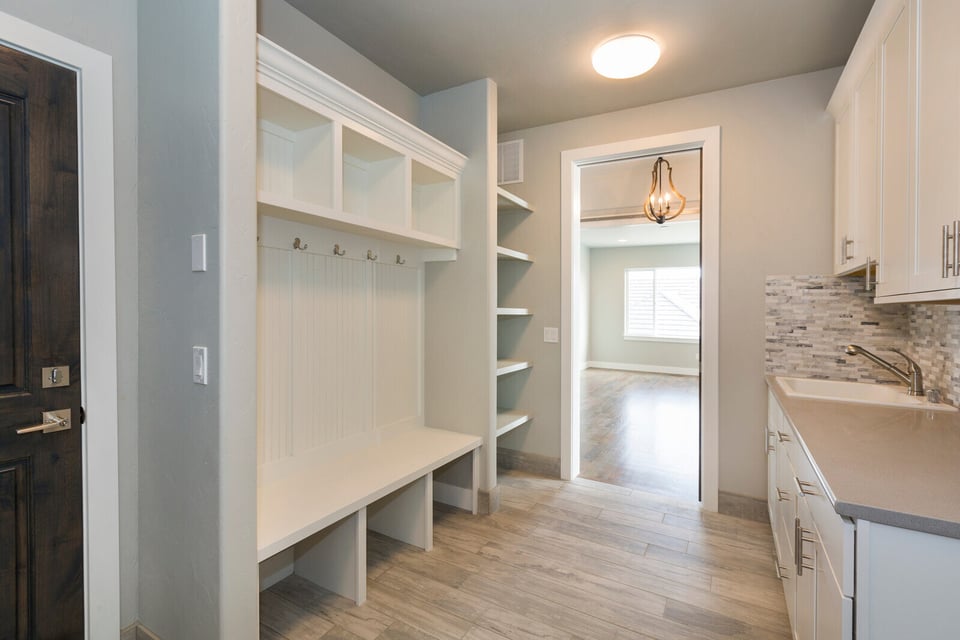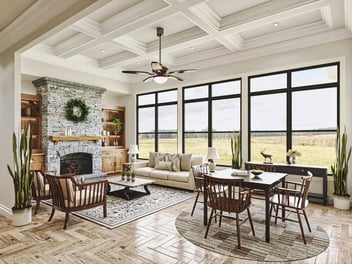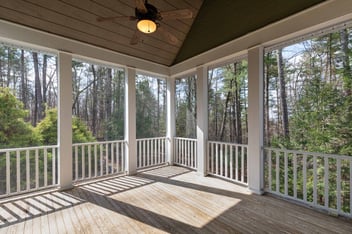4 Min Read
How Long Does It Take to Do an Addition in Durham or Raleigh?
Maybe the kids are sharing rooms, your kitchen has become a traffic jam, or you're finally ready to carve out a quiet workspace at home. You don’t need a new address; you just need a little more room to breathe.
Naturally, once homeowners start thinking about an addition, the next thing they want to know is: how long does a home addition take?
Knowing the home addition timeline in Raleigh, NC (or anywhere in the Triangle) helps you shape expectations and plan your next steps without guesswork. You might be thinking about a single-room bump-out, planning a second-story addition in Durham, NC, or exploring a full-scale house expansion in Raleigh, NC. No matter the size or scope, we’re breaking down exactly what to expect and what can influence the schedule along the way.

Every Addition is Different
No two additions follow the exact same path. Here are some of the biggest factors that shape your timeline:
- How big the addition is
- Whether it’s a ground-level or second-story expansion
- The city or county permitting process
- How fast design decisions are made
- Site access, weather, or existing conditions
Most projects in the area take about 4 to 6 months after permits are obtained. That window allows for design decisions, materials, inspections, and weather, all of which can vary by home. Additions aren’t off-the-shelf; they’re tailored, and your timeline should be too.
What the Process Looks Like and How Long Each Step Takes
When you’re planning a home addition, it helps to know what’s coming. Here's a breakdown of each phase in a typical room addition process in Raleigh, NC, along with a realistic time frame for how long each part usually takes.
1. Initial Consultation & Budget Discussion (1-2 weeks)
Start the conversation, walk the space, and talk through your goals. This early stage is all about understanding what matters most to you.
- Site visit and walkthrough
- Discussion around needs, ideas, and priorities
- Conceptual design budget proposal
2. Design & Planning (6-8 weeks)
Now it’s time to get ideas on paper. Your designer will create plans that reflect your goals and make sure everything lines up with local codes.
- Concept development and space planning
- Revisions based on your feedback
- HOA submittals (if needed)
3. Selections, Pricing, and Contract (2-3 weeks)
With a layout in place, you’ll start choosing finishes and reviewing costs. The clearer your decisions now, the smoother your build later.
- Select materials, fixtures, and finishes
- Receive updated pricing based on your choices
- Review and sign the construction contract
4. Permitting (4-6 weeks)
Once your plans are finalized, they head to your local permitting office. This step is necessary for all additions and ensures the work meets local codes. The timeline here depends a lot on where you live:
- Durham and Chapel Hill often take longer due to zoning overlays, historic districts, or environmental reviews.
- Raleigh generally moves a bit faster, though timing still depends on the season and workload.
- Wake County addition remodel projects can sometimes see quicker turnaround times, especially when documentation is complete and clear.
Across the Triangle, permitting usually takes anywhere from four to eight weeks. If your project includes unique zoning or HOA requirements, plan on a little extra time.
5. Scheduling and Material Ordering (2-4 weeks)
Once the green light is in hand, we’ll place material orders and secure your project on the calendar. This step can also be done in conjunction with Permitting.
- Final scheduling of trades and subcontractors
- Ordering items with known lead times
- Coordination of project kickoff
6. Construction (4-6 months)
This is when the transformation begins. You’ll see real progress week by week, and stay in the loop with regular updates.
- Site prep and foundation (if needed)
- Framing, rough-ins, and inspections
- Interior finishes and final punch list
We always recommend leaving some cushion for the unexpected, so things stay low-stress.
What Affects the Timeline of a Home Addition in the Triangle?
Every home addition comes with a few wild cards; some expected, some not. The good news? Most delays are avoidable when you know what to look out for.
Here are a few things that tend to impact the home addition timeline in Raleigh, NC, and nearby areas:
- Design complexity
A simple bump-out is usually quicker than a fully custom in-law suite or second-story addition. The more detailed the plans, the more time it takes to get them just right. - Permitting delays
Cities and counties move at different speeds. If your home is in an older neighborhood or under stricter zoning (like parts of Chapel Hill or Durham), reviews can take longer. - Material lead times
Custom windows, cabinetry, or specialty items can have long wait times, sometimes 6 weeks or more. That’s why early decisions matter. - Slow decision-making
Waiting on design or selection choices can hold up scheduling and orders. The faster the approvals, the smoother the timeline. - Weather
Heavy rain or freezing temperatures can delay inspections or exterior work. It’s one of the few things no one can control, but we always build a little buffer into the schedule just in case.
The key takeaway? Most factors affecting home addition duration are manageable with clear communication, thoughtful planning, and a little flexibility.
Second-Story Additions: Worth It, But a Bigger Lift
Adding a second story is one of the most impactful ways to create more living space, especially if your lot size makes it tough to build outward. But with that extra space comes a bit more complexity.
Here’s why these projects usually take longer than other types of home additions in Raleigh, NC:
- Structural upgrades are often needed to support the added weight. That could mean reinforcing the foundation or modifying framing.
- Utility lines like plumbing, electrical, and HVAC may need to be reconfigured or relocated.
- Access and staging can be more involved when working vertically.
Because of those added layers, a second-story addition in Durham, NC, typically lands on the longer end of the timeline. But the payoff is big: more usable square footage, more flexibility in your floor plan, and often a significant boost in long-term home value.
How To Keep Your Timeline on Track
Your builder plays a big role in managing the schedule, but so do you. If you're hoping to keep your Raleigh Durham home renovation timeline on track, there are a few simple things you can do that make a big difference:
- Be decisive during design. The sooner decisions are made, the sooner materials can be ordered and permits submitted.
- Stick to your selections. Changing materials or finishes mid-project often causes delays, especially if something needs to be reordered.
- Keep communication flowing. Questions, updates, and approvals are all easier when everyone stays in the loop.
- Build in some flexibility. Weather, inspections, or backordered items can occasionally shift things, but a little patience goes a long way.
Think of it as a team effort. The clearer and quicker your input, the more efficiently your contractor can keep things moving.
Why Triple Crown Contractors Is the Right Partner for Your Home Addition in Raleigh-Durham
A successful addition comes down to having a team that listens, communicates, and delivers exactly what your family needs, without the stress or confusion. That’s where Triple Crown Contractors stands apart.
We bring clarity to the home addition timeline in Raleigh, NC, guide you through the details, and handle the process from start to finish. From navigating permits in Durham to managing schedules in Wake County, we know the local systems inside and out.
Let’s talk about your space and your goals. Schedule a consultation with Triple Crown Contractors and take the first step toward your custom home addition in the Triangle.




